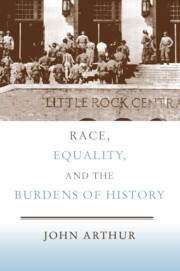4 - Racial Equality
Published online by Cambridge University Press: 03 December 2009
Summary
unlike in earlier centuries, today racial equality isin some sense widely accepted. But whatever consensus may exist at that abstract level evaporates when questions are raised about either its meaning or what it requires in practice. Besides disagreement about the idea of equality itself, other disputes about racial equality arise over what equality requires of government or society in general. What would a society that has achieved genuine racial equality look like? Some claim, for example, that racial equality is denied as long as there are significant differences in how racial groups fare economically or in any other important respect.
Although this chapter's primary focus is on the nature of racial equality, the discussion spills over into other related philosophical issues, including the value of persons and the ideal of social justice. My argument builds on the previous discussion of racism by linking the idea of institutional racism to the Equal Protection Clause of the Fourteenth Amendment to the U.S. Constitution. That clause, I argue, relies on an understanding of equality and the equal value of persons, and it seeks to put that understanding into practice by eliminating institutional racism. In that way, the earlier discussion of the nature of racism as racial contempt sheds light on a range of moral and legal puzzles. I conclude with a discussion of the pessimistic idea that because racism is inevitable, racial equality may be impossible.
- Type
- Chapter
- Information
- Race, Equality, and the Burdens of History , pp. 122 - 159Publisher: Cambridge University PressPrint publication year: 2007

